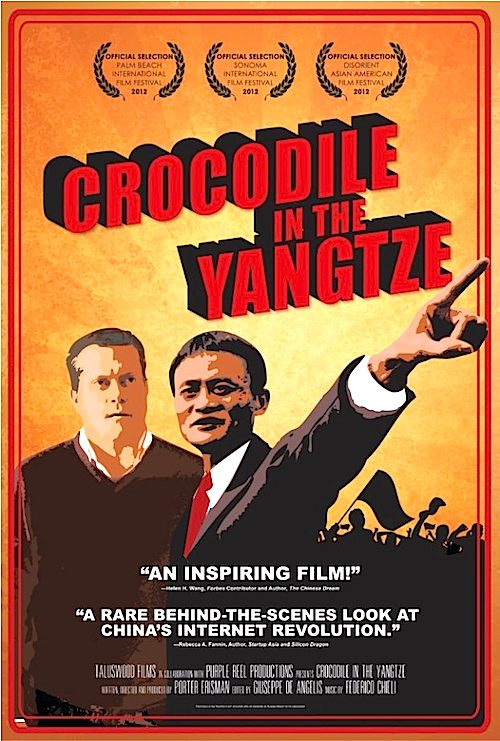 By Joe Bendel. Years from now, when historians ask who lost China, the answer might be ebay. After dominating the American online auction market through scrappy tenacity, they approached the Chinese market like a hidebound IBM. Jack Ma was the man who laughed all the way to the bank. The unlikely story of Ma’s dominance of Chinese e-commerce is told by a Westerner who witnessed it from the inside. Ma’s former PR honcho Porter Erisman documents the rise of the Chinese internet powerhouse Alibaba in the metaphorically titled Crocodile in the Yangtze, which screens this Saturday as part of the 2012 edition of Dances with Films.
By Joe Bendel. Years from now, when historians ask who lost China, the answer might be ebay. After dominating the American online auction market through scrappy tenacity, they approached the Chinese market like a hidebound IBM. Jack Ma was the man who laughed all the way to the bank. The unlikely story of Ma’s dominance of Chinese e-commerce is told by a Westerner who witnessed it from the inside. Ma’s former PR honcho Porter Erisman documents the rise of the Chinese internet powerhouse Alibaba in the metaphorically titled Crocodile in the Yangtze, which screens this Saturday as part of the 2012 edition of Dances with Films.
In 1995 English teacher Jack Ma did not look like a prospective billionaire, but he got the internet before just about anyone in China. In fact, his first venture, China Pages, was too early. He was still far ahead of the curve when he started his B2B site, Alibaba, with seventeen employees in his apartment. American expat Erisman signed on just as China’s legion of small manufacturers started embracing its potential. However, the internet bubble threatened to engulf the momentum Ma had generated. Like so many short-lived start-ups, Alibaba boasted more users and publicity than revenue. Actually, it did not have any revenue.
As it happened, in contrast to its ill-fated contemporaries, Alibaba offered a service that customers were willing to pay for. Much to the surprise of many analysts, Ma’s company survived and ultimately thrived. Yet, in proper visionary fashion, Ma anticipated a coming war with ebay. Strangely though, the American company ignored the lessons of its own success, banking on the benefits of integration into its global platform, while ignoring the specifics of the local market. This would be a hundred million dollar mistake, several times over.
On one hand, Crocodile is a quite invigorating underdog business success story. Despite facing several existential crises, Alibaba and its Taobao person-to-person e-marketplace carried the day. Yet, there is a darker side to the tale Erisman deals with rather perfunctorily. As part of its grand strategy, Alibaba aligned itself with Yahoo China, just as the search engine was taking heat for ratting out an independent journalist to the Communist regime. Erisman shows footage of Ma the good soldier parroting the Yahoo company line to the effect that they might not like local laws, but they must obey them nonetheless. Yet, this begs the obvious but unasked question: does Ma really dislike these laws and would he advocate liberalizing them? If so, what would an enormously wealthy individual such as himself be willing to do within the system towards that end?

Here and there, Erisman extols the internet as an instrument of openness and information dissemination in the formerly closed China – which is true to an extent, but ignores the great lengths the Chinese government has gone to monitor, censor, and block the free flow of the internet. One also wonders about the privacy of the Facebook-like innovations that helped put Taobao over the top.
Clearly, Erisman is too close to Ma to push him on any political questions, but he is unusually lucky to have such a wealth of video records of company events, including that fateful day one in Ma’s apartment. Frankly, the drive to document Alibaba, including even brainstorming sessions between Erisman and his boss, might strike some viewers as a bit odd. Yet they clearly provide a tenor of the times, both good and bad, during each stage of the company’s development. As a result, the understandable reliance on videotaped corporate history is not always particularly cinematic, but it certainly gives the film a you-are-there vibe.
There are a ton of objects lessons in Crocodile, regardless whether you consider Ma a charismatic business genius or a sell out to the oppressive power structure (hearing the local Communist Party boss laud him as an exemplary “entrepreneur” possibly supports either conclusion). Frankly, every e-commerce enterprise should study it frame by frame. After all, Alibaba’s IPO lived up to expectations, unlike the fizzle of a certain social network. Highly topical and instructive, if frustratingly cautious, Crocodile is well worth seeing this Saturday morning (6/2) when it screens as a selection of this year’s Dances with Films, in Hollywood, USA.
LFM GRADE: B-
Posted on May 29th, 2012 at 2:42pm.